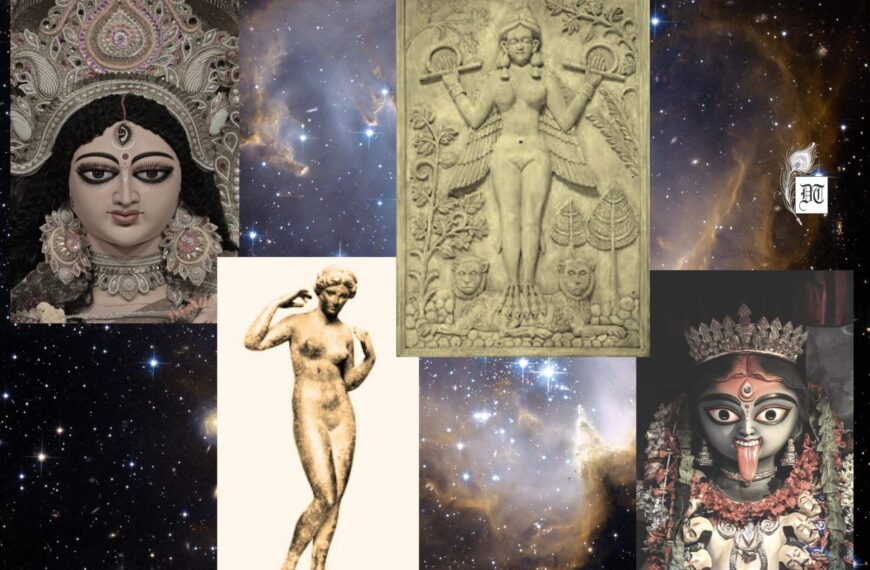Nilanjana recounts a tale from the Bhagavad where Sukha likens the human mind with different seasons of nature. He also explains the four stages of the life of a bhakta (devotee), in the weekly column, exclusively for Different Truths.
A stray cloud just hovered around the sky, perhaps to listen to the stories of Bhagavatam that Sukha was narrating to Parikshit. Sukha looked at the cloud and smiled to himself.
Parikshit asked, “What makes you smile?”
“The simple cowherds of Vrindavan were so lucky to enjoy the changing seasons with Krishna,” Sukha answered. “In fact, Krishna made every day and every moment so special for them. His sheer presence added a divine sparkle to their lives.
“Nature had sucked the life out of water bodies during summer. And with the onset of the rainy season, she returned it all back to them. She was perhaps behaving like a king who imposes taxes on his citizens but returns the same as benefits to them.
 “The sky was scattered with clouds and had lost it’s pure, tranquil, still nature of summer. Sudden outbursts of thunder, lightning, followed by a heavy shower of rains were a normal phenomenon then. Just like the tranquil mind of a yogi that, at times, gets clouded by the senses.
“The sky was scattered with clouds and had lost it’s pure, tranquil, still nature of summer. Sudden outbursts of thunder, lightning, followed by a heavy shower of rains were a normal phenomenon then. Just like the tranquil mind of a yogi that, at times, gets clouded by the senses.
“The clouds were like those great people who do not mind extinguishing themselves for the benefit of humanity. The earth, that was parched and dry owing to the summer heat had changed into luxuriant green and was looking very happy. Small rivers and brooks, that had ceased to exist, were alive and vibrant. The crops were growing happily and plenitude was all around.
“But the clouds made their presence felt. They enveloped the sky even at night. The stars and planets were not visible then. Just the way we don’t see the divine when our senses get the better of us. The only light visible was the glow-worms. Frogs began to croak, peacocks began to dance and the young boys of Vrindavan gave them company. Krishna was equally joyful, enjoying every moment with nature and his companions.
“As nature moved on from the rainy season towards a gentler autumn, the breeze brushed the earth softly. The skies were clearer and cloudless, the water is the lakes less muddy and the lotus bloomed happily. It reminded us of the mind of a yogi that once again was calm and tranquil when the onslaught of the senses had calmed down.”
Pariksit smiled, “You have so effortlessly drawn a parallel of nature with the human mind.”
Sukha observed, “When we are born in this planet, amidst nature, then we are bound by natural laws. In fact, that is why wise men have divided the life of a man into four stages:
- Brahmacharya – One is a student here. Under the guru, one receives education for getting support through life. In fact, one has to keep the guru happy to get knowledge. This stage also helps us get disciplined, whether we like it or not.
- Grihasta – This is the time for one to earn a living, get married and get entangled in the coils of samsara (regular family life). The responsibilities and rigors of such a life often cause tumult that people don’t enjoy. By the time one has completed responsibilities, the next stage takes ov
 er.
er. - Vanaprasta – With responsibilities complete and children grown-up, one is about to feel free. But physical discomforts come in the forefront. This new stage, where one has to get detached from the family is also not easy.
- Sanyasa – The expectation from this stage is that one has to shed all attachment to everything related to this life. But it is certainly not as easy as it sounds.
At all stages, bhakti (devotion) can help one sail through the trials and tribulations.”
Sukha stopped for a while as Parikshit reflected, “Indeed!”
[To be continued]
Footnote: Srimad Bhagavatam is often called the Bhagavad Purana. Authored by Ved Vyasa, the stories are about the various avatars (incarnations) of Lord Vishnu, also known as Narayana. These stories are narrated by Sukhadeva to King Parikshit.
©Nilanjana Dey
Photos from the Internet
#SrimadBhagavatam #MythAndMythology #CowherdsOfVrindavan #Krishna #DivineSparkle #HumanMind #ChangingSeasons #FourStagesOfLife #DifferentTruths
—



 By
By
 By
By
